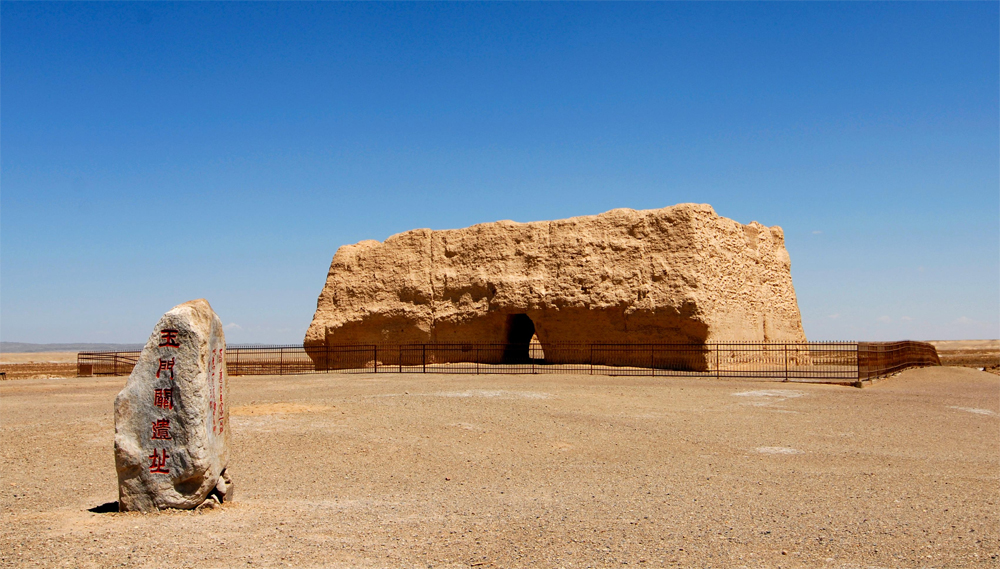Situated 75km northwest of Dunhuang, the Yumen Guan(玉门关) Pass was a strategic pass on the ancient Silk Road. It was so named because the jade of Hotan in nowaday’s Xinjiang region was transported to central China through this pass. In his poem Go North of Great Wall, the Tang Dynasty poet Wang Zhihuan had the famous line, “Beyond the Yumen Pass the breath of Spring has never crossed”. The mention of Yumen in the poem has made the pass more famous. Today, there is not much left and the only visible architecture there is the dirt tower. Wilderness dominates the area.
In the early Han Dynasty, the Huns ceaselessly invaded the Han’s area. At first, the weak Han rulers attempted to marry the daughters of imperial families to the Huns’ leaders, in hope of gaining temporary peace. When Emperor Wu rose to power, he immediately gave up this cowardly policy by launching fierce counterattacks on a large scale. Finally, the Hun’s troops were driven back. In order to strengthen the stability of the western frontier, this wise emperor ordered Yumenguan Pass and Yangguan Pass to be set up along the Hexi Corridor. Henceforth, these two passes of Great Wall, like two royal soldiers, honorably began to guard the western gate for their motherland.
In the past, the beautiful jade was transported to the inner China through this pass via the Silk Road, which gave the pass its name, Yumenguan, or “Jade-Gate Pass” in English. At that time, Yumenguan Pass served mainly as a post station for businessmen, military generals and ambassadors. It has witnessed the prosperity of business transactions along the Silk Road. The silk peculiar to inner China was transported to the western region in an endless stream. Cultural aspects of western China such as music and religion were introduced to central China at the same time. It is said that the grapes, pomegranates and walnuts now growing in central China were originally from the western area.
Two thousand years later, the light ringing sound of busy camel trains has disappeared.
The cry of sellers in the markets is completely gone. Yumenguan Pass of Great Wall has
lost its historic function. It is only a rectangular castle standing in the Gobi desert. It
covers an area of over 232 square miles, measuring 27 yards long, 29 yards wide and 32
feet high. The pass was built of rammed yellow earth and has two gates – the west gate
and the north gate. There is a walkway measuring 1.4 yards wide on the top. Nuqiang (a
jagged parapet on the wall) was set there too. In the southeast corner lies the "Ma Dao"
(Horse Ramp), by which people and horses could gain access to the top of the wall.
Climbing to the top of the pass, you can see the relics of the Great Wall and beacon
towers scattered sparsely in the desert, creating an atmosphere of recalling the past.











Awesome post! Keep up the great work! 🙂
Great content! Super high-quality! Keep it up! 🙂
Truly, this is a helpful webpage.
How is the COVID situation over there?
Hi, thank you. Dunhuang is a holly place, we never have any COVID19 cases, God Beless. Welcome to my region when the Covid 19 finish.
Steven